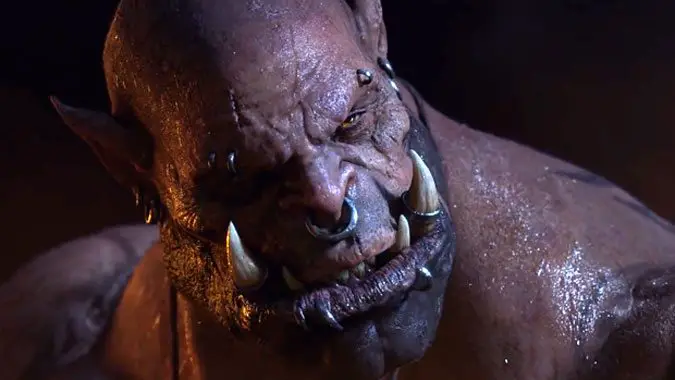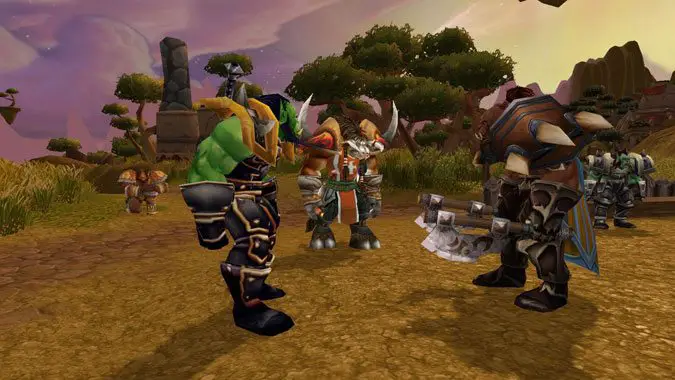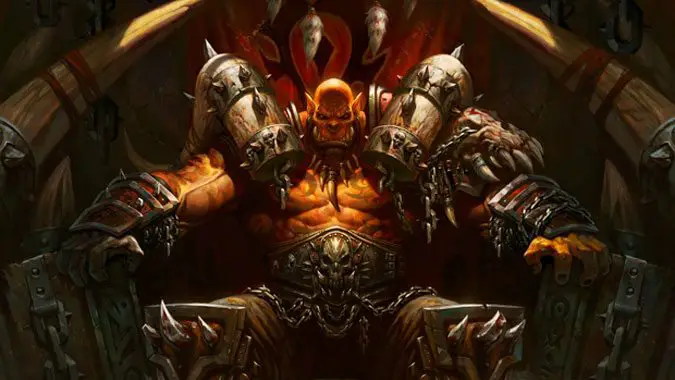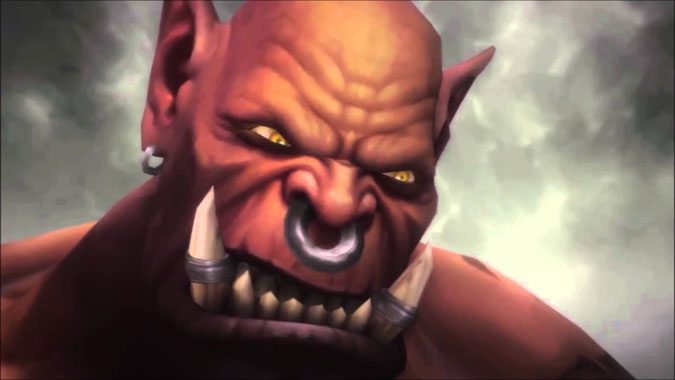Know Your Lore: Garrosh Hellscream

Garrosh Hellscream is headed to the Nexus — perhaps an appropriate epilogue for a story that swept through five expansions before its explosive finale. As a fairly straightforward hero brawler title, Heroes of the Storm doesn’t exactly have a lot of lore behind it. But the Nexus supposedly exists for one reason — testing heroes from across dimensions in the forge of combat.
And if there’s anyone out there eminently suitable for endless combat, it’s Garrosh Hellscream. Not just because he’s a powerful warrior, or because he possesses a keen tactical mind. No, it’s because Garrosh has spent the entirety of his life fighting, one way or another. Sure, there are the battles we’ve witnessed firsthand — as leader of the forces in Northrend, as Warchief, as the mind behind the formation of the Iron Horde. But while those outward battles were most visible, it’s the inner battles that made Hellscream into a force to be reckoned with.

The fight within
When we first encountered Garrosh back in Burning Crusade, he was mired deep in a personal battle we couldn’t really see — a battle against his own self-doubts. As the son of Grommash Hellscream, Garrosh was living under the weight of his family name. After all, Grom was the first to drink the blood of Mannoroth, an action that ultimately led the Orcish race to corruption. Well…most of the Orcish race.
In Garadar, the Mag’har were free from that corruption. The village was originally a quarantine zone for those afflicted with the red pox. Because of this, those that were isolated there were never exposed to the fel energy that corrupted the land and gave the Orcs’ skin its familiar green tint. The residents of Garadar took the name Mag’har — “uncorrupted” in Orcish — in reference to their origins. The rest of the Orcish race may have been corrupted, but the Mag’har dodged the bullet.
Garrosh grew up in a village of people that looked down on the one thing his father was best known for. He lived with the constant, persistent shame of his father’s actions. He was expected to lead the Mag’har after Geyah passed on — but how could he, after what his father had done? Was he doomed to lead the Mag’har to the same terrible fate his father had inflicted upon the rest of the Orcish race?
It wasn’t until Thrall arrived that Garrosh defeated his own worst enemy — himself. Once Thrall showed Garrosh that his father was not the monster he’d assumed, but instead a hero, Garrosh’s confidence and pride were restored. But he didn’t stay and lead the Mag’har, instead returning to Azeroth with Thrall.
After all, one battle had been won, but there were others to fight.

The fight for relevance
On Azeroth, Garrosh faced a new set of battles, mostly revolving around this strange Horde that Thrall had constructed in Kalimdor. Garrosh had to reconcile his memories of what the Horde had been with what Thrall created — two very different things. He wasn’t received with open arms as the son of a hero. And despite Thrall’s vision of what the Horde should be, there were many who weren’t happy with what had been established.
What Garrosh witnessed was a Horde that was growing disillusioned and even bitter with the way that Thrall chose to lead. Durotar was harsh and unforgiving, yet Thrall kept the Horde there and didn’t allow them to expand to places with more suitable living conditions. There were those that felt that they were still being punished, in a way — that they were atoning for sins they’d never committed. Destined to suffer under the shadow of actions their parents had taken, tied forever to that destiny due to the hue of their skin.
And Garrosh witnessed Thrall’s continued path of inaction, which translated into a seeming lack of care or concern for his people. Diplomacy made no sense to Garrosh. In the Horde Garrosh remembered, if your people had need of something, you went out and you took it. If someone stood in your way, you crushed them. It was simply the way things were. But his opinions were continually dismissed; his ideas ignored or shut down.
Eventually, it led to a direct confrontation with Thrall — a mak’gora issued in the wake of insult given to Garrosh’s father. But before the battle could reach its end, the Scourge attacked Orgrimmar, and Garrosh was sent to fight a new battle among the icy peaks of Northrend. The Lich King had returned, and someone needed to lead the Horde.

The fight for pride
Garrosh Hellscream thrived in Northrend. As a military leader, he excelled — and with no one to tell him otherwise, he took advantage of the distractions of war to fight the Alliance as well as the Scourge. These actions didn’t go unnoticed, but there was little that could be done to reign in the fury of Hellscream once it was in play. Northrend wasn’t just about defeating the Lich King, not to Garrosh. It was about establishing the Horde as a military powerhouse, a force to be reckoned with. {PB}
Advisors were sent to watch over Hellscream and keep him in check, but their words went largely ignored. And while the Horde fought battle after battle, Hellscream kept his eyes on the allies Thrall had gathered to his side. The Tauren fought well, but the Trolls were barely a presence in Northrend. The Forsaken could not be trusted to remain loyal — they demonstrated that they’d even turn on their own kind at the Wrathgate. And the Blood Elves were skilled at magic, but otherwise weak and few in number.
Despite this, the Horde prevailed. The Lich King was defeated, and Hellscream arrived to a hero’s welcome in Orgrimmar. In Northrend, Garrosh returned something to the Orcs that they’d lost long ago. He gave them back their pride. Hellscream showed them that there were other paths for the Horde to follow, paths that tossed aside humility and repentance in favor of sheer domination. Through his actions, he demonstrated that the only thing holding back the Horde was its own self-doubt — a lesson he’d learned well from Thrall.
What he didn’t expect was for Thrall to turn around and pronounce him Warchief. It wasn’t a position he asked for, but he took it — who was he to turn down another battle?

The fight for dominance
Thrall asked Garrosh to lead the Horde in the old ways, and that’s exactly what Hellscream did. The Old Horde wasn’t interested in peace and diplomacy. It was a collective of clans brought together to annihilate a perceived menace — the Draenei. It meant to dominate and conquer Draenor, and once the world proved to no longer be able to sustain the Orcs, they moved on to another world — Azeroth. Essentially, Garrosh picked up where the Old Horde left off and took the new Horde on a journey to complete what the Old never managed to accomplish.
And he was absolutely brutal about it. He elevated those allies that had proven their strength and usefulness, and belittled and ignored those that were beneath notice. If you had nothing to offer the Horde, the Horde had nothing to offer you. If you could not contribute to the Horde’s survival, the Horde cared little whether you yourself survived.
But this attitude, this course of action began to backfire on Hellscream. Instead of embracing their new path, the Horde began to rebel from within. What had once been a group of allies turned into a group of traitors, intent on bringing Hellscream down. They even joined forces with the Alliance to accomplish it. For the first time since leaving Garadar, Garrosh Hellscream did the unthinkable: he lost.

The fight for retribution
In the wake of that failure, what was Hellscream to do? Give up, sit in a cell and meditate upon his mistakes, regret his actions? Never. Garrosh was, is, and always has been a fighter at heart. Kairoz offered Garrosh a means of escape, but Garrosh saw more in that offer — opportunity. Yes, he’d lost one battle. But it didn’t mean he’d lost the war.
Through his curious manipulation of time and reality, Kairoz gave Garrosh the means to not just win the war, but to completely re-write the battlefield to Hellscream’s own exacting specifications. It was a chance to change history, to right what had gone wrong. It was a chance to save not just his father, but the Horde. The Horde of old — the true Horde. The Iron Horde.
In the end, the one battle Garrosh never finished finally caught up with him. Thrall arrived in Nagrand, and challenged Hellscream to finish the fight he’d started in Orgrimmar years before. And for the final time, Garrosh lost the fight — crushed by the elements and killed with a lightning strike on the same spot where his journey began in Garadar so long ago.
It’s only fitting that Hellscream arrive in Heroes of the Storm — he lived for combat, died in combat, dedicated his life to achieving glory. For himself, for the name Hellscream, and for the Horde. While his plans on Azeroth may have ended in failure, perhaps Garrosh will find more success in the Nexus, where endless battle is not only commonplace, but expected.
Please consider supporting our Patreon!
Join the Discussion
Blizzard Watch is a safe space for all readers. By leaving comments on this site you agree to follow our commenting and community guidelines.
 @Shadesogrey
@Shadesogrey



